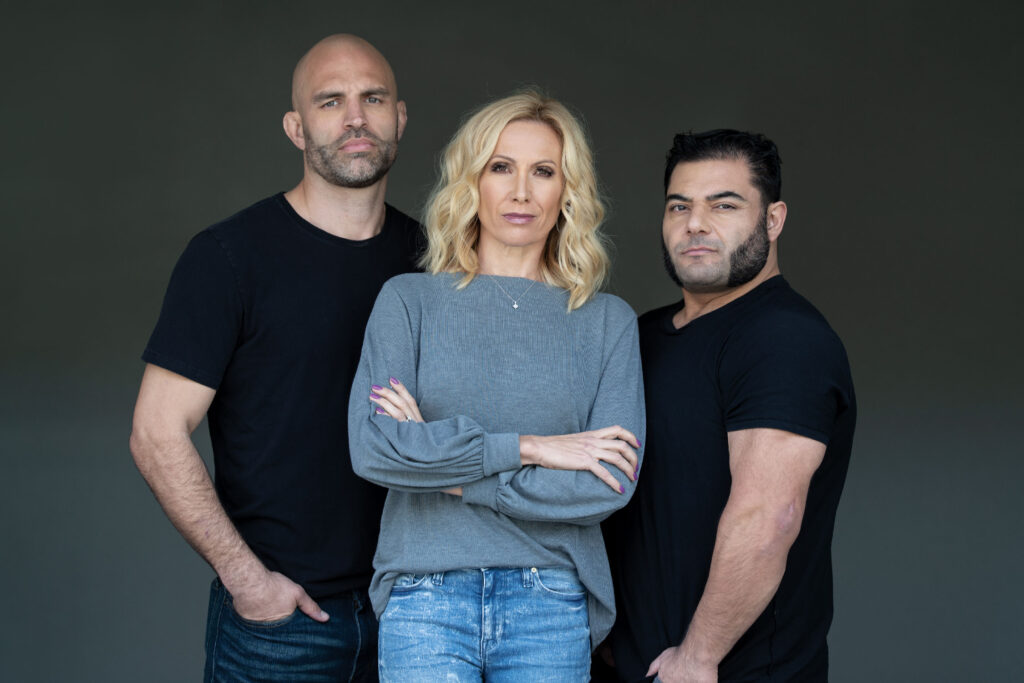Advertisement
What The Game Changers Changed
The buzzy documentary reached an unlikely audience by showing how a vegan diet can create faster, stronger, tougher athletes. Here’s what cast members think the film’s legacy will be—and what’s coming next in the world of plant-based performance.

Advertisement
Game on
(L-R) James Wilks, Dotsie Bausch, and Patrik Baboumian are just a few of the world-class athletes featured in The Game Changers.
When The Game Changers made its Netflix debut late last year, the powerhouse documentary about plant-based athletic performance quickly became a hit. Soon, people from all walks of life were seeking out a movie that promised to transform the way they looked at meat, protein, and muscle-building.
As my feeds blew up with the #GameChangersMovie hashtag, I gave in. It wasn’t that the topic didn’t interest me: I’d recently transitioned from a vegetarian diet to a vegan one. It’s just that I tend to avoid documentaries, especially ones that might go into graphic detail about animal cruelty.
It turns out I had The Game Changers all wrong. I devoured the movie, watching it a second time the next day and encouraging everyone in my immediate circle to do the same.
Advertisement
The Game Changers effect
It soon became clear that I wasn’t the only one moved by the documentary’s uplifting message and powerful science-backed arguments. The Game Changers follows narrator James “Lightning” Wilks, a former UFC fighter and winner of The Ultimate Fighter, through his research into a plant-based diet. The film was sparked by the surprising things Wilks learned about food and performance when he started exploring ways to recover from injuries to both his knees.
Along his journey, Wilks joined forces with a slew of executive producers, from James Cameron to Jackie Chan, plus an impressive roster of cast members: doctors, anthropologists, and—most prominently—fast, fit, and unbelievably strong athletes.
The response to the film has been undeniable. The Game Changers was swiftly crowned the best-selling documentary of all time on iTunes. At time of publication, the trailer alone has been viewed more than 11.5 million times on YouTube. The documentary joins the likes of Forks Over Knives, Super Size Me, What the Health, An Inconvenient Truth, and Food, Inc.—other films that tackled factory farming, food myths, and climate change in profound ways.
Even some of the cast members have been shocked by the film’s reach, including the man at its center. Wilks’s research has proven to be just as gripping for a mass audience as it was for him personally. In addition to discovering that animals are unnecessary “middlemen” for protein, vitamin B12, and other nutrients, Wilks learned he had been misled by many nutrition-related myths.
“I felt lied to my entire life, so I hope that the film is able to dispel the myth that we need animal products, especially meat, to be strong and healthy,” he says. “People should eat whatever they want, but freedom of choice is only freedom if you know all the facts.”
The Game Changers can be found on most digital platforms, including iTunes, Netflix, Google Play, and YouTube. With the film so widely available, the responses have poured in … and attacks have been launched.
Advertisement
Standing their ground
The Game Changers cast has had to play defense in the media—most famously when Wilks appeared on Joe Rogan’s podcast—standing up for the film’s research, cited studies, and in-film experiments. This contrasts with the overwhelmingly positive experiences cast members have had since the film’s debut.
Eight-time US national cycling champion Dotsie Bausch’s story of rocketing to an Olympic silver medal on a plant-based diet is a highlight of the film. Her gardener saw the movie and vowed to make changes; he asked her how to get started. Meanwhile, vegan health coach, bodybuilder, and The Game Changers alum Nimai Delgado is seeing increased interest in what used to be a niche fitness industry.
The medical experts in the documentary have seen shifts in their patients too. Dr. Columbus Batiste, Chief of Cardiology at Kaiser Permanente Riverside and Moreno Valley Medical Centers, says more of his patients understand the “why” of veganism and have started being interested in the “how.” Similarly, urologist and The Penis Book author Dr. Aaron Spitz has had more patient-initiated conversations about plant-based nutrition.
The film has also been accredited or supported by the Defense Health Agency and the Special Operations Medical Association, two organizations Wilks says are not persuaded by “fairy tales,” but by optimal performance in combat and reducing military health-care costs.
The cast believes the critical press seems to represent a small, vocal minority trying to dominate the discourse. They remain steadfast in their convictions.
“The debunking I’ve seen hasn’t been very concerning, nor has it led me to believe the movie missed the mark,” says Dr. Spitz, who had one of the film’s most talked-about moments: an observational experiment in which three college athletes measured their nocturnal erections after a meat-based and then a plant-based meal. (Spoiler alert: All the athletes had firmer, longer-lasting erections after chowing down on plants.)
“The criticism of my scene has been completely off base in some ways. Such criticisms haven’t made me think, ‘Hey, that’s a good point; we need to take care to address this,’” says Dr. Spitz.
Bausch is also indifferent to the haters.
“I would love for the other side to be surprising, but they never are,” she says. “It’s always the same old conversation.”
“I’m really interested to ask some of the critics why they’re so angry about it,” she adds. “No one is trying to take away your meat. The police aren’t breaking down the door to steal the steak off your plate, so why don’t you just ignore it?”
Advertisement
The film’s secret sauce
The term “vegan” was coined by The Vegan Society founder Donald Watson and a group of like-minded individuals in 1944. Veganism is not new. Nor are the books, medical studies, or films that support the movement. The benefits have been seemingly covered in every possible way, so how was The Game Changers able to make such an impact?
The cast members have theories. Many believe that the film’s success lies in creating a fourth entry point to plant-based eating for people not persuaded by health, animal activism, or climate change arguments.
Patrik Baboumian, the vegan world record-holding strongman who demonstrated jaw-dropping feats of strength in The Game Changers, says the movie speaks to “the audience farthest away from the general idea of veganism: men concerned about performance and masculinity.” He adds, “These people make up a huge group in society, but the statistics show that this group has the lowest number of vegans …. Culturally, this group is farthest away from caring about animals, so you can’t reach them with an ethical argument.”
The Game Changers focused on a message that would be persuasive to this group and to anyone interested in excelling physically: A plant-based diet promotes peak athletic performance and faster recovery. And it roped in the people best able to deliver this revelation—including the Terminator himself. (Arnold Schwarzenegger is both a cast member and an executive producer!)
Advertisement
Where veganism goes from here
Getting people to initially change their diet is the easy part; convincing people to stick to a new diet can be an uphill battle.
Delgado, who was raised by ethical vegetarian parents and has never eaten meat, says he understands the impact social pressure can have on a person’s decisions. He experienced it growing up and throughout his bodybuilding career.
“People walk out of the theater inclined to start making changes, but the social resistance can be overwhelming for new vegans,” he says. He stresses how important it is “to really arm yourself with knowledge, look at the evidence, and feel confident that this is the right decision for your health. So many people are misinformed that everyone tries to talk you out of it.”
Wilks agrees that the next step is not dispelling more myths, but rather giving people tools they need to succeed. The Game Changers website (gamechangersmovie.com) does this by offering resources, tips, and a weekly communication that walks people through the process of reducing or eliminating animal products in their diets.
Baboumian hopes that, with these resources at hand, The Game Changers can be the tipping point for people.
“I hope the movie will go down in history as one of the big milestones that moves societies around the globe to a more plant-based and sustainable way of living,” he says.
People should eat whatever they want, but freedom of choice is only freedom if you know all the facts.
– James Wilks
I would love for the other side to be surprising, but they never are. It’s always the same old conversation.
– Dotsie Bausch
The top 4 nutrition revelations from The Game Changers
Just in case you need a little refresher!
1. Supplements are the surest way for everyone to get their B12—not just vegans
One of the most popular criticisms of the vegan diet is that humans can’t get vitamin B12 from plants. But here’s the thing: Even meat eaters are at risk of vitamin B12 deficiency. How is this possible, you ask? Because B12 is actually made by bacteria, not by plants or animals. Today’s farm animals need supplements to get enough B12. Once you realize that, it makes sense to take the supplement yourself, no?
2. Plant-based iron is better for your heart
Iron comes in two forms: heme and non-heme. Heme iron is found only in animal products like red meat, poultry, and seafood; non-heme iron is the only type of iron found in plants. A comprehensive study found that even 1 mg per day of heme iron was associated with a 27 percent increased risk of coronary heart disease. Steak and hamburgers have the largest amounts of heme iron.
3. The optimal protein package is plant based
Not all proteins are created equal. Red meat, for example, has been shown to change the microbiome, causing gut bacteria that digest meat to multiply. This leads to overproduction of inflammatory mediators like TMAO (trimethylamine N-oxide). This molecule can impact blood flow through the arteries, making training and recovery more difficult. Meanwhile, plant-based proteins are packaged with antioxidants, phytochemicals, minerals, and vitamins that reduce inflammation and optimize recovery and performance.
4. Human bodies are better adapted for plant-based diets
Our bodies want to eat plants. Our long digestive systems are primed to break down fibrous plant materials, our trichromatic vision is useful for distinguishing colorful fruit, and our teeth are shaped primarily to grind down plants (not tear and shred meat). And yes, scientists are learning that the paleolithic record supports this conclusion: Our ancestors ate mostly plants because these foods were more readily available.
The research supporting the environmental benefits of eating plants just keeps growing (kind of like, you know, plants themselves). A recent study that assessed five popular diets in the US found that the average daily greenhouse gas emissions were lowest among vegans and vegetarians.
I hope the movie will go down in history as one of the big milestones that moves societies to a more plant-based and sustainable way of living.
– Patrik Baboumian





